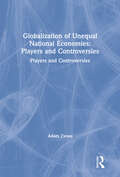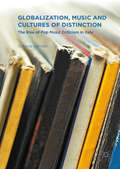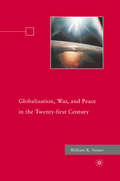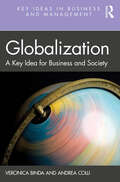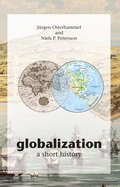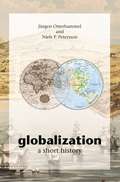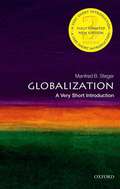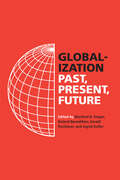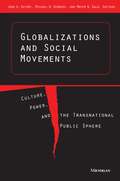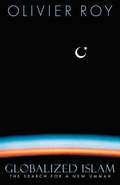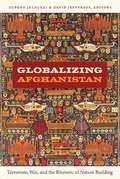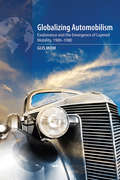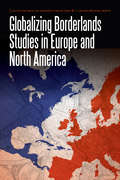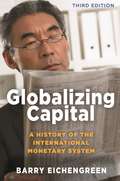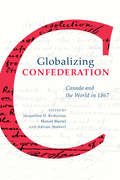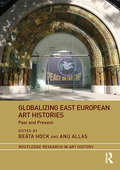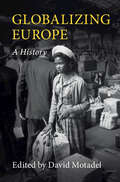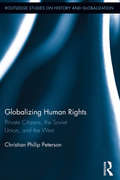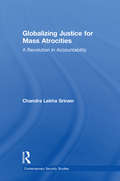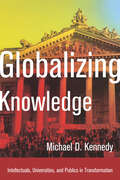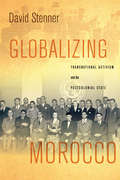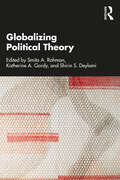- Table View
- List View
Globalization of Unequal National Economies: Players and Controversies
by Adam ZwassAs the Seattle protests over the formation of the WTO showed all too clearly, there is a strong need for in-depth understanding of how the globalization of the world economy is affecting the economic, political, and social development of the individual nation-states. This book provides a detailed and authoritative examination of the on-going issues related to globalization, such as the increasingly unfair distribution of the world's resources, and how this phenomenon is involving wildly disparate countries. While the main focus of the book is the United States, with its flexible markers, wide social differences, and its breath-taking level of economic expansion, extensive attention is also given to the other major players, including the European Union and those central and eastern European nations who very much want to become member countries, as well as China, India, Japan, Russia, and Southeast Asia.
Globalization, Music and Cultures of Distinction
by Simone VarrialeThis book is the first comprehensiveaccount of how Anglo-American popular music transformed Italian cultural life. Drawing on neglected archival materials, the author explores the rise of newmusical tastes and social divisions in late twentieth century Italy. The book reconstructs the emergence of popmusic magazines in Italy and offers the first in-depth investigation of therole of critics in global music cultures. It explores how class, gender, raceand geographical location shaped the production and consumption of music magazines,as well as critics' struggle over notions of expertise, cultural value andcosmopolitanism. Globalization, Music and Cultures ofDistinction provides an innovative framework for studying how globalization transforms cultural institutions andaesthetic hierarchies, thus breaking new ground for sociological and historicalresearch. It will be essential reading for scholars and students interested incultural sociology, popular music, globalization, media and cultural studies,social theory and contemporary Italy.
Globalization, War, and Peace in the Twenty-First Century
by William R. NesterThis book explores humanity's most persistent and tragic problem by answering some crucial questions including: How is military power created and asserted? What are weapons of mass destruction and what is the likelihood of them being used? What are the source, methods, and results of terrorism and counterterrorism?
Globalization: A Key Idea for Business and Society (Key Ideas in Business and Management)
by Andrea Colli Veronica BindaGlobalization: A Key Idea for Business and Society analyzes today’s process of global integration. Globalization is seen as a complex phenomenon, the drivers of which are of a technological, institutional, cultural and, not least, political nature.The book includes a historical analysis of the rise, and fall, of the “first globalization” wave which took place between the end of the Napoleonic Wars and the Great War. The chapters focus on the measurement of the global integration process, on the in-depth analysis of the above mentioned “drivers”, and on some of the actors playing a relevant role in the process itself – multinational companies and governments as owners of global companies. The conclusion of the book provides a perspective on the current “globalization backlash”, its determinants and possible future alternative scenarios.This book is an ideal resource for students and practitioners interested in past, present and future globalization.
Globalization: A Reference Handbook
by Justin Ervin Zachary A. SmithThe authors (a professor of and a PhD candidate in political science at Northern Arizona U.) present an introduction to the concept of globalization that includes the perspectives of neoliberals, institutionalists, and critics. It opens with an essay discussing definitional issues and the history of globalization, followed by a discussion of controversies associated with issues of technology, culture, the global economy, environmental problems, and national security, with each addressed from the three different perspectives mentioned above. The next chapter discusses the role the United States plays in the globalization process, particularly as it relates to the global economy, the environment, and global security. As with other volumes of the series, the volume includes a chronology of events, biographical profiles of significant individuals (including theorists and activists), select data and documents, a directory of organizations involved in or studying globalization, and an annotated list of print and nonprint resources.
Globalization: A Short History
by Niels P. Petersson Jürgen Osterhammel Dona Geyer"Globalization" has become a popular buzzword for explaining today's world. The expression achieved terminological stardom in the 1990s and was soon embraced by the general public and integrated into numerous languages. But is this much-discussed phenomenon really an invention of modern times? In this work, Jürgen Osterhammel and Niels Petersson make the case that globalization is not so new, after all. Arguing that the world did not turn "global" overnight, the book traces the emergence of globalization over the past seven or eight centuries. In fact, the authors write, the phenomenon can be traced back to early modern large-scale trading, for example, the silk trade between China and the Mediterranean region, the shipping routes between the Arabian Peninsula and India, and the more frequently traveled caravan routes of the Near East and North Africa--all conduits for people, goods, coins, artwork, and ideas.
Globalization: A Short History
by Niels P. Petersson Jürgen Osterhammel"Globalization" has become a popular buzzword for explaining today's world. The expression achieved terminological stardom in the 1990s and was soon embraced by the general public and integrated into numerous languages. But is this much-discussed phenomenon really an invention of modern times? In this work, Jürgen Osterhammel and Niels Petersson make the case that globalization is not so new, after all. Arguing that the world did not turn "global" overnight, the book traces the emergence of globalization over the past seven or eight centuries. In fact, the authors write, the phenomenon can be traced back to early modern large-scale trading, for example, the silk trade between China and the Mediterranean region, the shipping routes between the Arabian Peninsula and India, and the more frequently traveled caravan routes of the Near East and North Africa--all conduits for people, goods, coins, artwork, and ideas. Osterhammel and Petersson argue that the period from 1750 to 1880--an era characterized by the development of free trade and the long-distance impact of the industrial revolution--represented an important phase in the globalization phenomenon. Moreover, they demonstrate how globalization in the mid-twentieth century opened up the prospect of global destruction though nuclear war and ecological catastrophe. In the end, the authors write, today's globalization is part of a long-running transformation and has not ushered in a "global age" radically different from anything that came before. This book will appeal to historians, economists, and anyone in the social sciences who is interested in the historical emergence of globalization.
Globalization: A Very Short Introduction (Third Edition)
by Manfred Steger'Globalization' has become one of the defining buzzwords of our time - a term that describes a variety of accelerating economic, political, cultural, ideological, and environmental processes that are rapidly altering our experience of the world. It is by its nature a dynamic topic - and thisVery Short Introduction has been fully updated for a third edition, to include recent developments in global politics, the global economy, and environmental issues. Presenting globalization in accessible language as a multifaceted process encompassing global, regional, and local aspects of social life, Manfred B. Steger looks at its causes and effects, examines whether it is a new phenomenon, and explores the question of whether, ultimately, globalization is agood or a bad thing.
Globalization: Past, Present, Future
by Manfred B. Steger, Roland Benedikter, Harald Pechlaner, and Ingrid KoflerA free ebook version of this title is available through Luminos, University of California Press’s Open Access publishing program. Visit www.luminosoa.org to learn more. Since the end of the Cold War, globalization—the process and the idea—has been reshaping the world. Global studies scholarship has emerged to make sense of the transnational manifestations of globalization: economic, social, cultural, ideological, technological, environmental, and postcolonial. But a series of crises in the first two decades of the twenty-first century has put the neoliberal globalization system of the 1990s under severe strain. Are we witnessing a turn toward "deglobalization," intensified by the COVID-19 pandemic and the war in Ukraine or a moment of "reglobalization," spearheaded by digital technology? The contributors to this book employ transdisciplinary research to assess past developments, the current state, and future trajectories of globalization in light of today’s dynamics of insecurity, volatility, and geopolitical tensions.
Globalizations and Social Movements: Culture, Power and the Transnational Public Sphere
by John A. Guidry Michael D. Kennedy Mayer N. ZaldThis clear and concise book examines the crucial relationship between globalization and social movements. Deftly combining nuanced theory with rich empirical examples, leading scholar Valentine M. Moghadam focuses especially on three transnational social movements--Islamism, feminism, and global justice. Defining globalization as a complex process in which the mobility of capital, peoples, organizations, movements, and ideas takes on an increasingly transnational form, the author shows how both physical and electronic mobility has helped to create dynamic global social movements. Globalization has engendered the spread of neoliberal capitalism across the world, but it also has engendered opposition and collective action. Exploring the historical roots of Islamism, feminism, and global justice, the book also shows how these movements have been stimulated by relatively recent globalization processes, including neoliberalism, war, and hegemonic masculinities. Moghadam examines similarities and differences among the three movements, along with internal differentiation within each. Her argument is informed by feminism, world-systems, world polity, and social movement theories in a seamlessly integrated framework that will be essential reading for all students of globalization.
Globalized Finance and Varieties of Capitalism (International Political Economy Series)
by Hans ZonHans van Zon analyzes the financialization of developed capitalism, and argues that the emergence of finance as a dominant force has contributed to the relative decline of the West. He demonstrates that the neo-liberal model is inherently unstable and undermines capitalist economies, which can only function if they are embedded in institutions that are non- or even pre-capitalist. He shows how a toxic combination of financialization, corporate globalization, and a deregulated and parasitic financial industry have led to structural economic stagnation in both the USA and the greater part of the EU.
Globalized Islam: The Search for a New Ummah
by Olivier RoyCommentary on the Culture and its value.
Globalizing Afghanistan: Terrorism, War, and the Rhetoric of Nation Building
by Zubeda Jalalzai David JefferessGlobalizing Afghanistan offers a kaleidoscopic view of Afghanistan and the global networks of power, influence, and representation in which it is immersed. The military and nation-building interventions initiated by the United States in reaction to the events of September 11, 2001, are the background and motivation for this collection, but they are not the immediate subject of the essays. Seeking to understand the events of the past decade in a broad frame, the contributors draw on cultural and postcolonial approaches to provide new insights into this ongoing conflict. They focus on matters such as the implications of Afghanistan's lucrative opium trade, the links between the contemporary Taliban movement and major events in the Islamic world and Central Asia since the early twentieth century, and interactions between transnational feminist organizations and the Afghan women's movement. Several contributors address questions of representation. One looks at portrayals of Afghan women by the U. S. government and Western media and feminists. Another explores the surprisingly prominent role of Iranian filmmaking in the production of a global cinematic discourse about Afghanistan. A Pakistani journalist describes how coverage of Afghanistan by reporters working from Pakistan's Khyber-Pakhtoonkhwa (formerly the North West Frontier Province) has changed over the past decade. This rich panoply of perspectives on Afghanistan concludes with a reflection on how academics might produce meaningful alternative viewpoints on the exercise of American power abroad. Contributors. Gwen Bergner, Maliha Chishti, Cheshmak Farhoumand-Sims, Nigel C. Gibson, Zubeda Jalalzai, David Jefferess, Altaf Ullah Khan, Kamran Rastegar, Rodney J. Steward, Imre Szeman
Globalizing Automobilism: Exuberance and the Emergence of Layered Mobility, 1900–1980
by Gijs MomWhy has “car society” proven so durable, even in the face of mounting environmental and economic crises? In this follow-up to his magisterial Atlantic Automobilism, Gijs Mom traces the global spread of the automobile in the postwar era and investigates why adopting more sustainable forms of mobility has proven so difficult. Drawing on archival research as well as wide-ranging forays into popular culture, Mom reveals here the roots of the exuberance, excess, and danger that define modern automotive culture.
Globalizing Borderlands Studies in Europe and North America (Borderlands and Transcultural Studies)
by Michael North John W.I. LeeBorderlands are complex spaces that can involve military, religious, economic, political, and cultural interactions—all of which may vary by region and over time. John W. I. Lee and Michael North bring together interdisciplinary scholars to analyze a wide range of border issues and to encourage a nuanced dialogue addressing the concepts and processes of borderlands. Gathering the voices of a diverse range of international scholars, Globalizing Borderlands Studies in Europe and North America presents case studies from ancient to modern times, highlighting topics ranging from religious conflicts to medical frontiers to petty trade. Spanning geographical regions of Europe, the Baltics, North Africa, the American West, and Mexico, these essays shed new light on the complex processes of boundary construction, maintenance, and crossing, as well as on the importance of economic, political, social, ethnic, and religious interactions in the borderlands. Globalizing Borderlands Studies in Europe and North America not only forges links between past and present scholarship but also paves the way for new models and approaches in future borderlands research.
Globalizing Capital: A History of the International Monetary System - Third Edition
by Barry EichengreenEssential reading for understanding the international economy—now thoroughly updatedLucid, accessible, and provocative, and now thoroughly updated to cover recent events that have shaken the global economy, Globalizing Capital is an indispensable account of the past 150 years of international monetary and financial history—from the classical gold standard to today's post–Bretton Woods "nonsystem." Bringing the story up to the present, this third edition covers the global financial crisis, the Greek bailout, the Euro crisis, the rise of China as a global monetary power, the renewed controversy over the international role of the U.S. dollar, and the currency war. Concise and nontechnical, and with a proven appeal to general readers, students, and specialists alike, Globalizing Capital is a must-read for anyone who wants to understand where the international economy has been—and where it may be going.
Globalizing Confederation: Canada and the World in 1867
by Marcel Martel Jacqueline Krikorian Adrian ShubertGlobalizing Confederation brings together original research from 17 scholars to provide an international perspective on Canada’s Confederation in 1867. In seeking to ascertain how others understood, constructed or considered the changes taking place in British North America, Globalizing Confederation unpacks a range of viewpoints, including those from foreign governments, British colonies, and Indigenous peoples. Exploring perspectives from the Austro-Hungarian Empire, France, Latin America, New Zealand, and the Vatican, among others, as well as considering the impact of Confederation on the rights of Indigenous peoples during this period, the contributors to this collection present how Canada’s Confederation captured the imaginations of people around the world in the 1860s. Globalizing Confederation reveals how some viewed the 1867 changes to Canada as part of a reorganization of the British Empire, while others contextualized it in the literature on colonization more broadly, while still others framed the event as part of a re-alignment or power shift among the Spanish, French and British empires. While many people showed interest in the Confederation debates, others, such as South Africa and the West Indies, expressed little interest in the establishment of Canada until it had profound effects on their corners of the global political landscape.
Globalizing East European Art Histories: Past and Present (Routledge Research in Art History)
by Beáta Hock Anu AllasThis edited collection reassesses East-Central European art by offering transnational perspectives on its regional or national histories, while also inserting the region into contemporary discussions of global issues. Both in popular imagination and, to some degree, scholarly literature, East-Central Europe is persistently imagined as a hermetically isolated cultural landscape. This book restores the diverse ways in which East-Central European art has always been entangled with actors and institutions in the wider world. The contributors engage with empirically anchored and theoretically argued case studies from historical periods representing notable junctures of globalization: the early modern period, the age of Empires, the time of socialist rule and the global Cold War, and the most recent decades of postsocialism understood as a global condition.
Globalizing Europe: A History
by David MotadelGlobalizing Europe explores modern Europe's myriad entanglements with the wider world, considering the continent not only as an engine but also as a product of global transformations. It looks at the ways in which the global movements of peoples and ideas, goods and raw materials, flora and fauna have impacted life on the continent over the centuries. Bringing together a group of leading historians, the book shows how the history of Europe can be integrated into global history. Taken together, its chapters will help reshape our understanding of the boundaries of Europe – and the field of modern European history.
Globalizing Human Rights: Private Citizens, the Soviet Union, and the West (Routledge Studies on History and Globalization)
by Christian PetersonGlobalizing Human Rights explores the complexities of the role human rights played in U.S.-Soviet relations during the 1970s and 1980s. It will show how private citizens exploited the larger effects of contemporary globalization and the language of the Final Act to enlist the U.S. government in a global campaign against Soviet/Eastern European human rights violations. A careful examination of this development shows the limitations of existing literature on the Reagan and Carter administrations’ efforts to promote internal reform in USSR. It also reveals how the Carter administration and private citizens, not Western European governments, played the most important role in making the issue of human rights a fundamental aspect of Cold War competition. Even more important, it illustrates how each administration made the support of non-governmental human rights activities an integral element of its overall approach to weakening the international appeal of the USSR. In addition to looking at the behavior of the U.S. government, this work also highlights the limitations of arguments that focus on the inherent weakness of Soviet dissent during the early to mid 1980s. In the case of the USSR, it devotes considerable attention to why Soviet leaders failed to revive the international reputation of their multinational empire in face of consistent human rights critiques. It also documents the crucial role that private citizens played in shaping Mikhail Gorbachev’s efforts to reform Soviet-style socialism.
Globalizing Justice for Mass Atrocities: A Revolution in Accountability (Contemporary Security Studies)
by Chandra Lekha SriramThis major new study examines the developing practice of universal jurisdiction, as well as the broader phenomenon of "globalizing" justice, and its ramifications. With a detailed overview of the contemporary practice of universal jurisdiction, it discerns three trends at work: pure universal jurisdiction, universal jurisdiction "plus", and non-use. It also argues that these disparities in practice should raise serious concerns as to the legitimacy and perceived legitimacy of such globalized justice. It then turns to a further consideration, that of globalized justice, precisely because it takes place far from the locus of the crime, and is therefore "externalized" and may fail to achieve many of its putative goals. In addition, this is a key assessment of civil accountability, through the use of the Alien Tort Claims Act in the United States. It details how the use of civil penalties may offer new avenues for redress, particularly with relation to group accountability, whether that of armed groups or of corporations. However, it balances this approach to accountability with recognition of certain flaws within externalized criminal accountability. This study also focuses on mixed tribunals, or other methods of internationalized justice as viable alternatives, which may avoid some of the problems with external justice, but are themselves far from perfect. Mixed or hybrid tribunals in East Timor and Sierra Leone represent different models of hybrid justice and provide the reader with excellent examples of these new forms of justice in action. This book will be of great interest to all students and scholars of human rights international law and political science.
Globalizing Knowledge: Intellectuals, Universities, and Publics in Transformation
by Michael D. KennedyHeralding a push for higher education to adopt a more global perspective, the term "globalizing knowledge" is today a popular catchphrase among academics and their circles. The complications and consequences of this desire for greater worldliness, however, are rarely considered critically. In this groundbreaking cultural-political sociology of knowledge and change, Michael D. Kennedy rearticulates questions, approaches, and case studies to clarify intellectuals' and institutions' responsibilities in a world defined by transformation and crisis. Globalizing Knowledge introduces the stakes of globalizing knowledge before examining how intellectuals and their institutions and networks shape and are shaped by globalization and world-historical events from 2001 through the uprisings of 2011–13. But Kennedy is not only concerned with elaborating how wisdom is maintained and transmitted, he also asks how we can recognize both interconnectedness and inequalities, and possibilities for more knowledgeable change within and beyond academic circles. Subsequent chapters are devoted to issues of public engagement, the importance of recognizing difference and the local's implication in the global, and the specific ways in which knowledge, images, and symbols are shared globally. Kennedy considers numerous case studies, from historical happenings in Poland, Kosova, Ukraine, and Afghanistan, to today's energy crisis, Pussy Riot, the Occupy Movement, and beyond, to illuminate how knowledge functions and might be used to affect good in the world.
Globalizing Morocco: Transnational Activism and the Postcolonial State
by David StennerThe end of World War II heralded a new global order. Decolonization swept the world and the United Nations, founded in 1945, came to embody the hopes of the world's colonized people as an instrument of freedom. North Africa became a particularly contested region and events there reverberated around the world. In Morocco, the emerging nationalist movement developed social networks that spanned three continents and engaged supporters from CIA agents, British journalists, and Asian diplomats to a Coca-Cola manager and a former First Lady. Globalizing Morocco traces how these networks helped the nationalists achieve independence—and then enabled the establishment of an authoritarian monarchy that persists today. David Stenner tells the story of the Moroccan activists who managed to sway world opinion against the French and Spanish colonial authorities to gain independence, and in so doing illustrates how they contributed to the formation of international relations during the early Cold War. Looking at post-1945 world politics from the Moroccan vantage point, we can see fissures in the global order that allowed the peoples of Africa and Asia to influence a hierarchical system whose main purpose had been to keep them at the bottom. In the process, these anticolonial networks created an influential new model for transnational activism that remains relevant still to contemporary struggles.
Globalizing Political Theory
by Smita A. Rahman Shirin S. Deylami Katherine A. GordyGlobalizing Political Theory is guided by the need to understand political theory as deeply embedded in local networks of power, identity, and structure, and to examine how these networks converge and diverge with the global. With the help of this book, students of political theory no longer need to learn about ideas in a vacuum with little or no attention paid to how such ideas are responses to varying local political problems in different places, times, and contexts. Key features include: Central Conceptual Framework: Introducing readers to what it means to “globalize” political theory and to move beyond the traditional western canon and actively engage with a multiplicity of perspectives. Organization: Focused on key topics essential for an introductory class aimed at both globalizing political theory and showing how political theory itself is a globalizing activity. Themes: Colonialism and Empire; Gender and Sexuality; Religion and Secularism; Marxism, Socialism, and Globalization; Democracy and Protest; and Race, Ethnicity, and Indigeneity. Pedagogy: Each chapter features theoretical concepts and definitions, political and historical context, key authors and biographical context, textual evidence and exegesis from the foundational texts in that thematic area, a list of discussion questions, and a list of resources for further reading. Committed to a multiplicity of perspectives and an active engagement between the global and the local, Globalizing Political Theory connects directly with undergraduate and graduate-level courses in political theory, global political theory, and non-western political thought.
Globalizing Political Theory
by Smita A. Rahman Shirin S. Deylami Katherine A. GordyGlobalizing Political Theory is guided by the need to understand political theory as deeply embedded in local networks of power, identity, and structure, and to examine how these networks converge and diverge with the global. With the help of this book, students of political theory no longer need to learn about ideas in a vacuum with little or no attention paid to how such ideas are responses to varying local political problems in different places, times, and contexts.Key features include: Central Conceptual Framework: Introducing readers to what it means to “globalize” political theory and to move beyond the traditional western canon and actively engage with a multiplicity of perspectives. Organization: Focused on key topics essential for an introductory class aimed at both globalizing political theory and showing how political theory itself is a globalizing activity. Themes: Colonialism and Empire; Gender and Sexuality; Religion and Secularism; Marxism, Socialism, and Globalization; Democracy and Protest; and Race, Ethnicity, and Indigeneity. Pedagogy: Each chapter features theoretical concepts and definitions, political and historical context, key authors and biographical context, textual evidence and exegesis from the foundational texts in that thematic area, a list of discussion questions, and a list of resources for further reading. Committed to a multiplicity of perspectives and an active engagement between the global and the local, Globalizing Political Theory connects directly with undergraduate and graduate-level courses in political theory, global political theory, and non-western political thought.
